人教新目标八年级下册Unit 4重点短语复习
2020年人教版新目标 英语 八年级下册 Unit 4 Why don’t you talk
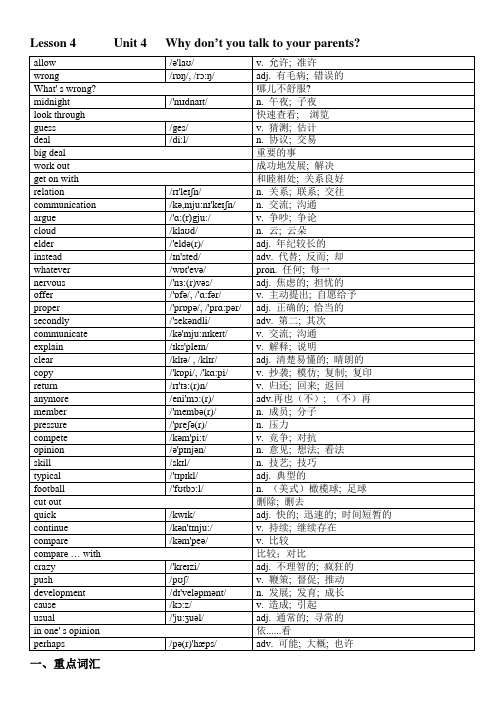
Lesson 4 Unit 4 Why don’t you talk to your parents?一、重点词汇1. allow v.允许;准许allow sb to do sth ; allow doing sth;be (not) allowed to do妈妈允许我周末看电视。
My mother allows me to watch TV on weekends.不允许在教室吃饭。
We don’t allow eating in the classroom.2.deal n.a great deal of time许多He was trying to make a deal with them.交易v. 处理,多与with连用相关词组:a good/great deal很多It' s a deal.就这么定了 a big deal大事deal with常与how连用do with常与what连用3.Look through浏览,快速查看含look的常用短语:look up;look at; look out; look for; look after; look like; look around; look down on/ upon; look over 4.argue v.争论argument n.Argue with sb = have an argument with sb 与某人争辩Argue on / about sth 辩论某事Argue with sb about sth为某事与某人争论我和她争论哪个队伍会赢。
I’m arguing with her about which team will win.5.Offer v.&n.提供Offer to do sth主动提出做某事;offer sb sth = offer sth to sb 提供某人某物他主动提出借我几本书。
Unit+4+单元知识点复习讲义+-2023-2024学年人教版英语八年级下册

Unit 4 Why don’t you talk to your parents ?【重点短语】1.有空闲时间2. 允许某人做某事3. 与某人闲逛4. 课外活动课5. 与某人吵架/打架6. 直到半夜7. 与某人交谈8. 太多9. 学得过多10. 有足够的睡眠11. r给某人写信12. 打电话给某人13. 令某人惊讶14. 翻看15. 生某人的气16. 重要的事17. 成功地发展;解决18. 与...相处19. 经常吵架/打架20. 笼罩21. 拒绝做某事22. 主动提出做某事23. 以便24. 介意某人做某事25. 一直26. 今后27. 使某人生气28. 担心某事29. 抄袭某人的作业30. 做自己31. 独自消磨时光32. 给某人施压33. 与某人吵架34. 与某人竞争35. 业余活动要点1 Why don’t you...?句型Why don’t you do sth.? =Why not do sth.? 你为什么不做某事呢?1.—What should I get for my mother's birthday? —Why _________ buy her a scarf?A.don't you B.do you C.are you D.aren't you 2.为什么不去旅游呢?_________ ____________go travelling. =_________ ____________ _________go travelling.要点2 allowallow v.允许;准许(1)allow sb. to do sth. 允许某人做某事She doesn’t allow me to smoke here. 他不允许我在这吸烟。
(2)be (not) allowed to do sth. (不)被允许做某事Passengers are not allowed to smoke. 乘客不允许吸烟。
新目标八年级下册英语Unit4 why don39;t you talk to your parents重点知识讲解
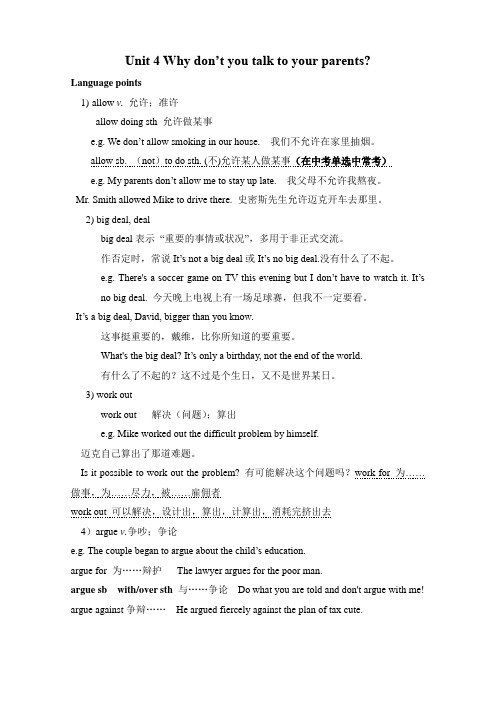
Unit 4 Why don’t you talk to your parents?Language points1)allow v.允许;准许allow doing sth 允许做某事e.g. We don’t allow smoking in our house. 我们不允许在家里抽烟。
allow sb. (not)to do sth. (不)允许某人做某事(在中考单选中常考)e.g. My parents don’t allow me to stay up late. 我父母不允许我熬夜。
Mr. Smith allowed Mike to drive there. 史密斯先生允许迈克开车去那里。
2) big deal, dealbig deal表示“重要的事情或状况”,多用于非正式交流。
作否定时,常说It’s not a big deal或It’s no big deal.没有什么了不起。
e.g. There's a soccer game on TV this evening but I don’t have to watch it. It’sno big deal. 今天晚上电视上有一场足球赛,但我不一定要看。
It’s a big deal, David, bigger than you know.这事挺重要的,戴维,比你所知道的要重要。
What's the big deal? It’s only a birthday, not the end of the world.有什么了不起的?这不过是个生日,又不是世界某日。
3) work outwork out 解决(问题);算出e.g. Mike worked out the difficult problem by himself.迈克自己算出了那道难题。
Is it possible to work out the problem? 有可能解决这个问题吗?work for 为……做事,为……尽力,被……雇佣者work out 可以解决,设计出,算出,计算出,消耗完挤出去4)argue v.争吵;争论e.g. The couple began to argue about the child’s education.argue for 为……辩护The lawyer argues for the poor man.argue sb with/over sth 与……争论Do what you are told and don't argue with me! argue against争辩……He argued fiercely against the plan of tax cute.5). proper adj.正确的;恰当的e.g. It’s not proper to visit a friend too late in the evening.太晚了,去看朋友不合适。
2020年春人教新目标英语八年级下册unit4-知识点分析与练习(无答案)
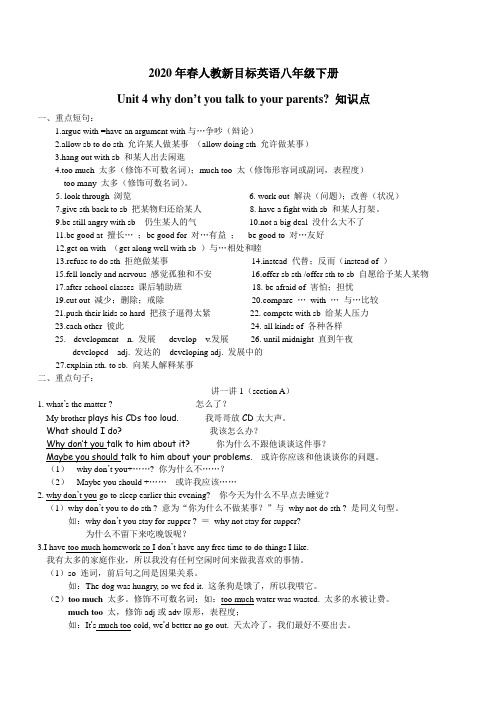
2020年春人教新目标英语八年级下册Unit 4 why don’t you talk to your parents? 知识点一、重点短句:1.argue with =have an argument with与…争吵(辩论)2.allow sb to do sth 允许某人做某事(allow doing sth 允许做某事)3.hang out with sb 和某人出去闲逛4.too much 太多(修饰不可数名词);much too 太(修饰形容词或副词,表程度)too many 太多(修饰可数名词)。
5. look through 浏览6. work out 解决(问题);改善(状况)7.give sth back to sb 把某物归还给某人8. have a fight with sb 和某人打架。
9.be still angry with sb 仍生某人的气10.not a big deal 没什么大不了11.be good at 擅长…;be good for 对…有益;be good to 对…友好12.get on with (get along well with sb )与…相处和睦13.refuse to do sth 拒绝做某事14.instead 代替;反而(instead of )15.fell lonely and nervous 感觉孤独和不安16.offer sb sth /offer sth to sb 自愿给予某人某物17.after-school classes 课后辅助班18. be afraid of 害怕;担忧19.cut out 减少;删除;戒除pare …with …与…比较21.push their kids so hard 把孩子逼得太紧22. compete with sb 给某人压力23.each other 彼此24. all kinds of 各种各样25.development n. 发展develop v.发展26. until midnight 直到午夜developed adj. 发达的developing adj. 发展中的27.explain sth. to sb. 向某人解释某事二、重点句子:讲一讲1(section A)1. what’s the matter ? 怎么了?My brother plays his CDs too loud. 我哥哥放CD太大声。
人教新目标八年级英语下册unit4知识点

⼈教新⽬标⼋年级英语下册unit4知识点Unit 4 Why don't you talk to your parents?重点短语hang out闲逛, too many太多, get into a fight争吵,go to sleep去睡觉, call sb up给某⼈打电话be good at擅长,talk about谈论, on the phone在电话中, have a fight打架,look through浏览, give back归还, be angry with sb⽣某⼈的⽓, big deal重要的事, thanks for因…⽽感谢, no problem没问题, work out成功的发展解决, get on with和睦相处, feel lonely感到孤独,sit down坐下. communicate with sb与某⼈交流, next time下次,make friends交朋友, be worried about担忧, study for a test为考试⽽学习, be afraid of害怕, in front of在…前⾯, not anymore不再,play sports做运动, watch movies看电影, so much/many那么多,do homework做作业, have lessons上课, do chores做家务,cut out删除, a few⼏个少许, all kinds of各种各样的, compare with把…与…⽐较, join after- school activities参加课外活动, in one's opinion依…看, turn down调⼩, be good for对…有好处动词短语allow sb to do sth允许某⼈做某事, why don't you do sth你为什么不做某事呢,want to do sth想要做某事, find sb doing sth发现某⼈正在做某事,tell sb to do sth告诉某⼈要做某事, refuse to do sth拒绝做某事,let sb do sth让某⼈做某事, offer to do sth 主动提出做某事,mind sb doing介意⼲某事, not …until直到……才,want sb to do想让某⼈做某事, it's time for sth该做某事了,it's adj to do做某事是…的, keep on doing继续做某事,why do you think of…?你认为…怎么样, what's wrong哪⼉不舒服.重点句⼦My parents don't allow me to hang out with my friend.I got into a fight with my best friend.What's wrong?I'm not good at writing letters.I don't want to talk about it on the phone.I found my sister looking through my thingings yesterday.I guess you could tell her to say sorry.Although she's wrong it's not a big deal.My problem is that I can't get on well with my family.Relations between my parents have become difficult.I don't know if I should say anything to them about this.When they argue, it's like a big black cloud, hanging over our home.Although my elder brother is not very nice to me.Instead he watches whatever he wants until late at night.At home I feel lonely and nervous.If your parents are having problems you should offer to help.Maybe you could do more jobs around the house, so that they have more time for proper communication. Secondly , why don't you sit down and communicate with your brother?You should explain that you don't mind him watching TV all the time.My cousin borrows my things without returning them.You left your homework at home.You're afraid of speaking in front of people.Your best friend, doesn't trust you anymore.The Taylors are a typical American family.Maybe I could cut out a few of their activities.I really want them to be successful.However the tired children don't get home until after 7:00 p.m.They have a quick dinner,then it's time for homework.In some families, competition starts very young and continues until the kids get older.And they are always comparing them with other children.It's crazy.People shouldn't push their kids so hard.Doctor says too much pressure is not good for a child's development.Doctor Alice Green says all these activities can cause a lot of stress for children.重点1.allow sb to do sth允许某⼈做某事allow sth允许某事allow doing sth 允许做某事be allowed to do sth被允许做某事The doctor allowed him to take a short walk every day.I don't think she will allow it.We don't allow smoking in our house.We are not allowed to throw rubbish everywhere.2.Get into a fight with sb=Have a fight with sb.=fight with sb.和某⼈打架We can't get into a fight with each other at school.3.What's wrong?=what's the matter?询问某⼈有什么问题,有什么不顺⼼的事,询问某物出了什么⽑病?What's wrong?I left my bag on the bus.What's wrong with your finger?There is something wrong with my bike.Your answer is wrong but hers is right.4.Be good at擅长⼲某事, be good for对…有益be good to对…好be good with善于应付…的.He is good at drawing.Drink more water is good for you.She is very good to her neighbors.He's very good with children.5.On the phone⽤电话交谈, on the Internet 通过互联⽹on the radio.通过收⾳机What did you say on the phone?He is chatting on the Internet.6、Look through查看,浏览, look after照顾. Look at看着, look for寻找,look out of向…外看, look forward to doing.盼望⼲某事The through the passage quickly and answer the questions.7.I guess +宾语从句(变否定句时,否定要前移)I guess that he's right.I don't guess that he is right.8.Say sorry /hello /thanks/ goodbye to sb.向某⼈抱歉/问候/感谢/道别。
春人教新目标英语八年级下册Unit4单元知识点总结全解
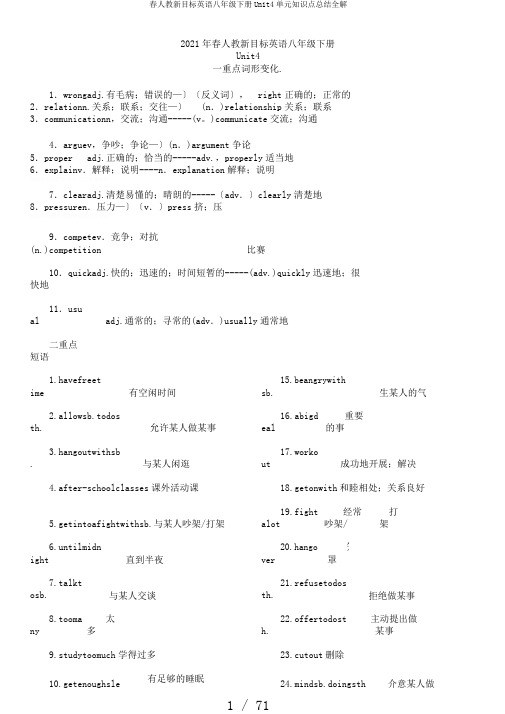
2021年春人教新目标英语八年级下册Unit4一重点词形变化.1.wrongadj.有毛病;错误的—〕〔反义词〕,right正确的;正常的2.relationn.关系;联系;交往—〕(n.)relationship关系;联系3.communicationn,交流;沟通-----(v。
)communicate交流;沟通4.arguev,争吵;争论—〕(n.)argument争论5.proper adj.正确的;恰当的-----adv.,properly适当地6.explainv.解释;说明----n.explanation解释;说明7.clearadj.清楚易懂的;晴朗的-----〔adv.〕clearly清楚地8.pressuren.压力—〕〔v.〕press挤;压9.competev.竞争;对抗(n.)competition比赛10.quickadj.快的;迅速的;时间短暂的-----(adv.)quickly迅速地;很快地11.usual adj.通常的;寻常的(adv.)usually通常地二重点短语1.havefreetime有空闲时间15.beangrywithsb.生某人的气2.allowsb.todosth.允许某人做某事16.abigdeal重要的事3.hangoutwithsb.与某人闲逛17.workout成功地开展;解决4.after-schoolclasses课外活动课18.getonwith和睦相处;关系良好5.getintoafightwithsb.与某人吵架/打架19.fightalot经常吵架/打架6.untilmidnight直到半夜20.hangover笼罩7.talktosb.与某人交谈21.refusetodosth.拒绝做某事8.tooma ny太多22.offertodosth.主动提出做某事9.studytoomuch学得过多23.cutout删除10.getenoughsle 有足够的睡眠24.mindsb.doingsth介意某人做ep.某事11.writesb.aletter给某人写信25municatewithsb.与某人交流12.callsb.up打给某人26.infuture今后13.surprisesb.令某人惊讶27.makesb.Angry使某人生气14.lookthrough浏览;翻看28.worryaboutsth.担忧某事29.copyone’shomework抄袭某人的作业36.freetimeactivities业余活动30.beoneself做自己37.getbettergrades取得更好的成绩31.familymembers家庭成员38.giveone’sopinion提出某人的观点32.spendtimealone单独消磨时光39.learnexamskills学习应试技巧33.givesb.pressure给某人施压40.practicesports体育训练34.haveafightwithsb.与某人吵架41.causestress造成压力35petewithsb.与某人竞争三重点句型:Myparentsdon’tallowmetohangoutwithmyfriends.我的父母不允许我和朋友一起闲逛。
八年级英语下册知识讲义-重点单词(Unit 4 )-人教新目标

初中英语重点单词(下册Unit 4 Why don’t you talk to your parents?)知识梳理allow v. 允许;准许wrong adj. 错误的;不对的guess v. 猜测;估计deal n. 协议;交易relation n. 关系;联系;交往communication n. 交流;沟通argue v. 争吵;争论cloud n. 云;云朵elder adj. 年纪较长的instead adv. 代替;反而;却whatever pron. 任何;每一nervous adj. 焦虑的;担忧的offer v. 主动提出;自愿给予proper adj. 正确地;恰当地secondly adv. 第二;其次communicate v. 交流;沟通copy v. 复制;复印return v. 回来;回去member n. 成员;分子pressure n. 压力compete v. 竞争;对抗opinion n. 意见;想法;看法skill n. 技艺;技巧typical adj. 典型的football n. 足球continue v. 持续;继续存在compare v. 比较crazy adj. 不理智的;疯狂的push v. 推动;移动development n. 发展;发育;成长cause n. 造成;引起usual adj. 通常的;寻常的perhaps adv. 可能;大概;也许二、重点单词【单词学习】1. allow v. 允许;准许【用法】(1)allow sb. to do sth. 允许某人做某事(2)allow (doing)sth. 允许(做)某事(3)be allowed to do sth. 是allow sb. to do sth.的被动结构,意为:被允许做某事。
【例句】His parents don’t allow him to go out at night. 他父母不允许他晚上出去。
英语人教版新目标八年级下册知识整理Unit4

【英语】八年级||下册教材全梳理(Unit4 He said I was hard -working )知识·巧学生词巧解【词析】音析:元音字母a读[].形析:形近词sad(忧愁的;悲哀的)义析:angry and crazy【典句】He was mad with joy.他欣喜假设狂.【拓展】固定搭配:be mad at/with =be angry with/at 生……的气【词析】音析:元音字母a发[e],ore在词尾读作[].形析:any(任何) +more(更多)义析:any longer,from now on【典句】He doesn ,t come here anymore.他再也不到这儿来了.【拓展】可构成not...anymore词组,也可写成no more .表达"不再〞的词组还有not...any longer/no longer,no more 和no longer用于句末.【辨析】not...anymore/no more与not...any longer/no longernot...anymore/no more指做某事次数不再增加,多与瞬间动词连用;not...any longer/no longer指时间上不再延续,多与持续性动词连用.first of all 首||先【词析】形析:first(第|一) +of +all(所有)义析:at first,the beginning【典句】First of all,you should think,and then speak.你应该先考虑,后开口.【拓展】first of all的同义词为at first,反义词为at last,in the end,finally等.【词析】音析:元音字母e发[e],a发[I].形析:mess(混乱) +age(年龄)义析:information,news sent to sb.in writing or speech【典句】Will you take this message to your brother?把这个便条捎给你哥哥好吗?【拓展】与message有关的词组有:give sb. a message 给……传个口信take a message for sb. 为……捎个口信leave a message 留言pass on 传递【词析】义析:take sth.to different places【典句】Let us now pass on to the next subject.现在让我们看看下一个题目.【拓展】后接宾语时可以构成pass on sth. to sb./pass on sb. sth.,当宾语为代词时只能用前一种.【词析】音析:重读开音节词,u读作[],元音字母o发本音[].形析:sup(超) +pose(姿态)义析:think about sth.that is not real now【典句】Let ,s suppose (that) the news is true.让我们假定这消息是真的 .【拓展】固定搭配:be supposed to被期望或被要求do well in 在……方面做得好【典句】I do well in drawing.我擅长画画.【拓展】be good at 相当于do well in,意思为"擅长……〞.be good at 的比较级||为be better at,do well in 的比较级||为do better in .be in good health 身体健康【词析】形析:be +in(在……状态下) +good(好的) +health(健康)义析:keep healthy,keep fit【典句】I hope you are in good health.我希望你身体健康.【拓展】表示身体健康的其他短语有:be healthy 健康的stay/keep healthy 保持健康【词析】形析:er读作[],ou读作[].形析:nerv(e)(神经的) + -ous(形容词后缀)义析:not relaxed,not comfortable【典句】I felt very nervous when I went into his office.当我走进他的办公室时,我感到很紧张.【拓展】固定搭配:be nervous about对……感到紧张【词析】音析:重读闭音节词,字母u读作[],i和y读作[I].形析:lucky(幸运的)变y为i + -ly(副词后缀)义析:fortunately【典句】Luckily,the police came right away.很幸运,警察马上就来了.【拓展】1)同根词:luck n.运气;lucky adj.幸运的2)反义词:unluckily【词析】音析:元音字母u读作[],词尾的e不发音.形析:形近词blue(蓝色)义析:right,not against【典句】Is it true that you are rich?你很富有是真的吗?【拓展】同根词:truth n.真理;truly adv.真实地【词析】音析:ow读作[].形析:形近词town(城镇)义析:belong to oneself【典句】She makes her own clothes.她自己做衣服.【拓展】own作为形容词意为"自己的〞,常用在表示所有格的词后起强调作用.作为动词意为"拥有〞,名词为owner(主人) .轻轻告诉你Every heart has its own sorrow.各人有各人的苦恼.get over 克服;恢复;原谅【词析】形析:get(得到) +over(在上面)义析:recover,forgive sb.【典句】Can we get over this difficulty?我们能克服这个困难吗?【拓展】与get有关的词组有:get to 到达get on 上车get off 下车get ready for 为……作准备get up 起床【词析】音析:第|一个a读作[],第二个a读作[I] .义析:person who finish the study in a college【典句】Two thirds of the graduates find jobs.三分之二的毕业生找到了工作.【拓展】作为动词意为"毕业〞可构成graduate from "毕业于……〞.【词析】音析:闭音节词,字母i读作\I\] .形析:形近词than(比)义析:not dense or concentrated【典句】The air there is very thin.那里的空气很稀薄.【拓展】作"稀薄的〞讲时反义词为thick,作"瘦的〞讲时反义词为fat .【词析】音析:字母e和i均读作[I],sion读作[].形析:deci(de)(决定) +sion(名词后缀)义析:something you must make a choice at one time【典句】She could not make a decision about the dresses.她对(买不买)这衣服下不了决心.【拓展】make a decision to do sth. =decide to do sth.(决定做某事)【词析】音析:ar读作[].形析:star(星星) +t义析:begin【典句】If you are ready,you may start your work.如果你准备好了,你可以开始工作了.【拓展】start作为动词"开始〞时与begin同义,其后可接动名词或动词不定式.【辨析】begin与start一般情况下,这两个词都可接动名词或动词不定式,二者用法相同.以下两种情况下只能用start,而不用begin .1)当机器"开动、发动〞时.2)作为"旅途〞开始时.care for 照顾,照料【词析】形析:care(关心) +for(为了……)义析:take care of,look after【典句】The boy is too young to care for himself.这个男孩太小,不能照顾自己.【词析】音析:元音字母a发本音[eI],字母组合er发[].形析:d +anger (愤怒)义析:risk;a source or an instance of risk or peril【典句】In war,life is full of danger for everyone.在战争中,每个人的生活都充满了危险.【拓展】1)与danger有关的词组有:in danger 在危险中out of danger 出险;脱险2)danger的形容词形式:dangerous例句精讲Section ALana thinks she ,s coming to my house to study.拉娜以为她要到我家来学习.【巧解句构】这是一个含有宾语从句的主从复合句,主句为一般现在时态,从句是用趋向性动词come的现在分词表将来.【拓展延伸】宾语从句的时态必须与主句照应:当主句中谓语是现在或将来时态,从句谓语不受主句谓语时态的影响,可以按需要使用任何时态,例如:She says that she has never been to Mount Tai.1)当主句谓语为过去时态,从句中的时态一般为过去的某种时态.例如:He said he had finished his homework.2)当从句表达的是某一客观真理(事实)时,主句无论是何种时态,从句那么用一般现在时.例如:He said that light travels much faster than sound.误区警示假设宾语从句跟在动词think,believe,suppose,expect等表示"要,认为〞等的动词后时,句子的否认表达在主句上,这就是"否认转移〞现象.例如:I don ,t think you are right.我认为你不正确.I don ,t believe he has finished his work.我相信他还没有完成他的工作.Section B 3a1.I was sorry to hear that he had a cold last week.我听说他上周感冒了觉得很难过.【巧解句构】这是一句包含宾语从句的主从复合句.主句是过去时态,从句也用过去时态.本句中that变为了宾语从句he had a cold last week的引导词.【要点剖析】I was sorry to hear that...是表示遗憾的常用语,意为"我听到……很遗憾〞.have a cold意为"患感冒〞还可以写成catch a cold .类似的词组还有:have a cough 咳嗽have a fever 发烧have a headache 头疼2.I had a really hard time with science this semester,and I wasn ,t surprised to find that my worst report was from my science(科学)teacher.这学期我的科学课学得确实很吃力,所以当我看到最||糟糕的评价来自于科学课老师时,我毫不吃惊.【巧解句构】这是一句由and连接的并列句.前一个分句是简单句,后一个分句是包含宾语从句的主从复合句,主句I wasn ,t surprised to find "我毫不吃惊地发现……〞,不定式的动词find后面带一个由that引导的宾语从句.【要点剖析】词组have a hard time with sth.意为"应付某事很费力〞;be surprised to意为"对……感到吃惊〞,不定式后接动词的原形.surprised为形容词,surprise为名词构成to one ,s surprise(使……惊奇的是)词组.【辨析比较】surprised 和surprising1)当人作主语或修饰与人有关的词时用以ed结尾的形容词.2)当物作主语或修饰与物有关的词时用以ing结尾的形容词.例如:We are surprised to hear the surprising news.我们听到那条令人惊讶的新闻感到非常吃惊.3.The good news is that my math teacher said I was hard -working.好消息是数学老师说我很用功 .【巧解句构】这是一句包含表语从句的主从复合句 .主句the good news is使用的是一般现在时,表示目前的情况.由that引导的从句my math teacher said I was hard working在句中充当表语,使用的是一般过去时,陈述过去.其中又包含一个从句I was hard working,作said的宾语.【拓展延伸】表语从句于主句中的系动词之后,主要有四类:1)由连词who,what,which 等引导的表语从句.这些词不但可以起连接作用,还可以在句中作主语、宾语和表语.例如:China is not what she was yesterday.中|国已不再是以前的那个中|国了.2)由不充当任何句子成分的连词that,whether引起的表语从句.例如:What I mean is that we should help each other.我的意思是我们应该互相帮助.The problem is whether we can finish the work on time.问题是我们能不能按时完成工作.3)由连接副词when,where,why,how 引导的表语从句 .例如:This is when I really get to know Americans.我这时才开始认识美|国人.4)由连词as,because,as if,as though 引导的表语从句.例如:It looks as if it is going to rain tonight.看起来好似今晚要下雨.Self Check 2Last week in school we had a big fight,and she didn ,t talk to me.上周在学校我们大吵了一架,她不和我说话了 .【巧解句构】这是一个and连接的前后均是一般过去时态的并列句.【要点剖析】1)短语have a fight意为"吵架〞,后面接宾语时要加上介词with,即have a fight with等同于fight with sb.(此时的fight为动词) .2)短语talk to sb.意为"与……谈话/交谈〞,to也可以被with替换 .如果talk后面接的是"某事〞那么介词用about即talk about sth. .She said helping others changed her life.1.Teaching high school students in a poor mountain village in Gansu Province may not sound like fun to you.在甘肃省一个贫困山村教中学生,在你听来也许并不有趣 .【巧解句构】该句是个简单句.这句话的主语很长,一个动名词短语(teaching high school students "教中学生〞)加上两个地点状语(in a poor mountain village "贫困山村〞和in Gansu Province "甘肃省〞)构成了本句的主语.谓语局部那么使用了sound like短语,表示"听来并不有趣〞.【要点剖析】短语sound like 意为"听起来像……〞,sound是一个系动词,类似的词还有:feel,smell,taste,look,get,turn等.2.She said that both she and her husband thought this was a good idea.她和她丈夫都认为这是一件很好的事.【巧解句构】该句是个复合句,said后面的that引导的是宾语从句,是said的内容;句中的thought后面也是一个宾语从句,但省略了引导词that .通常宾语从句由that引导时,常可省去that,但said后的that常保存.【要点剖析】词组both...and...意为"(两者)都〞是并列连词可以连接两个人或物一起作主语.反义词为neither...nor...,它们的用法不同:neither...nor...引导的词作主语时谓语动词与nor 后的词保持一致即就近原那么;both...and...无此用法 .3.There is no difference between you and them.你和他们之间没有不同.【巧解句构】该句是一个there be句型,名词difference作句子的真正主语,no相当于not any .There is no difference between...and...意为"在……和……之间没有区别〞 .如果表示"有区别〞,那么使用There is a difference between...and...或者There are differencesbetween...and... .【要点剖析】词组between...and...表示"在……之间〞,between只用于二者之间.【拓展延伸】there be句型的一些用法:1)主谓一致谓语动词要采取就近一致原那么,和靠近be的主语一致.例如:There is a pen,two rulers in the box.盒子里有一只钢笔,两把尺子.There are two boys and a teacher at the school gate.门口有两个男孩,一个老师.2)主语后的动词形式在there be 句型中,主语与动词是主动关系时用现在分词;是被动关系时用过去分词.例如: There is a purse lying on the ground.地上有一个钱包.There are five minutes left now.现在还有5分钟.3)反意疑问句反意疑问句应与there be对应,而不是依据主语.例如:There is a radio on the table,isn ,t there?桌子上有一台收音机,是吧?There are more than fifty classes in your school,aren ,t there?你们学校有50个班,是吧?4)there be 与have的替换there be表示所属时可与have替换.There is nothing but a book in my bag. =I have nothing but a book in my bag.在我包里只有一本书.记忆要诀there be 句型的谓语歌诀there be句型可译"有〞,be 动词跟着名词走.名词单数不可数,当用is记清楚.如果名词是复数,用are一定要记住.出现并列主语特殊记, "就近原那么〞用仔细.4.I can open up my students , eyes to the outside world and give them a good start in life.我能为我的学生翻开眼界看外面的世|界,并且给他们的生活一个好的开始 .【巧解句构】该句是一个含有情态动词的一般现在时态的简单句,and连接前后两个并列谓语.【要点剖析】1)短语open up one ,s eyes 意为"使……开眼界〞.2)动词give有两种用法:give sb. sth.和give sth. to sb. .5.When her year was over,she said that she would return to the area after finishing her studies.一年期满时她说:毕业后她会回到这个地方.【巧解句构】该句是个包含时间状语从句和宾语从句的主从复合句.时间状语从句when her year was over意为"当她的一年(支教)期结束时……〞.主句是一个间接引语,that...studies作said的宾语从句,时态为过去将来时,说明是在"当时〞要离开的时候,杨蕾承诺"将来〞要回到这个地方;在这个宾语从句中after finishing her studies作为一个时间状语,点明了她将要回来的时间为"完成学业后〞.【要点剖析】1)短语be over意为"结束〞.2)return to...意为"返回……〞.语法解读直接引语和间接引语引述或转述别人的话称为"引语〞.直接引用别人的原话,两边用引号"〞标出,叫做直接引语;用自己的语言转述别人的话,不需要引号,叫做间接引语,实际上间接引语大都是宾语从句,其中由祈使句转换的间接引语除外,其转换后是不定式.那么直接引语为陈述句、一般疑问句、特殊疑问句和祈使句,转换为间接引语时,句子的结构,人称、时态、时间状语和地点状语等都要有变化,如何变化呢?一、人称的转变下面有一句顺口溜"一随主,二随宾,第三人称不更新〞可以帮助我们记忆."一随主〞是指在直接引语变间接引语时,如果从句中的主语是第|一人称或被第|一人称所修饰,从句中的人称要按照主句中主语的人称变化.例如:He said, "I am very happy.〞He said that he was very happy."二随宾〞是指直接引语变间接引语时,假设从句中的主语及宾语是第二人称或被第二人称所修饰,从句中的人称要跟引号外的主句的宾语一致.如果引号外的主句没有宾语,也可以用第|一人称,例如:She said to her son, "I ,ll check your homework tonight.〞She said to her son that she would check his homework that night."You should be more careful next time,〞my grandfather said.My grandfather said that I should be more careful the next time."第三人称不更新〞是指直接引语变间接引语时,如果从句中的主语及宾语是第三人称或被第三人称所修饰,从句中的人称一般不需要变化.例如:Mr.Smith said, "Jack is a good student.〞→ Mr.Smith said Jack was a good student.总之,人称的转换不是固定的,具体情况、具体对待,要符合逻辑.二、时态的转换直接引语改为间接引语时,主句中的谓语动词如果是过去时,从句(即间接引语局部)的谓语动词在时态方面要作相应的变化,变成过去时范畴的各种时态(实际也是宾语从句的时态要求),变化如下:一般现在时→一般过去时现在进行时→过去进行时现在完成时→过去完成时一般将来时→过去将来时一般过去时→过去完成时过去完成时→不变过去进行时→不变例如:1. "I am very glad to visit the Great Wall ,〞she said.→She said she was very glad to visit the Great Wall.2.Jim said, "We are listening to the music.〞→Jim said that they were listening to the music.3.Mother asked, "Have you finished your homework before nine o ,clock?〞→Mother asked me whether I had finished my homework before nine o ,clock.4.He asked the policeman, "Where shall I find the nearest bookshop?〞→He asked the policeman where he would find the nearest bookshop.5. "Why did she go there?〞the teacher asked.→The teacher asked why she had gone there.6.Mother asked me, "Had you finished your homework before supper?〞→Mother asked me whether I had finished my homework before supper.7.Tom said, "We were having a football match this time yesterday.〞→Tom said that they were having a football match that time the day before.三、结构的转换1.陈述句.用连词that引导,that在口语中常省略.主句的谓语动词可用直接引语中的said,也可用told来代替,注意,可以说said that,said to sb. that,told sb. that,不可直接说told that .例如:He said, "I have been to the West Lake.〞He said to us that he had been to the West Lake.He said, "I ,ll give you an exam next week.〞He told us that he would give us an exam the next week.(不可说told that)此外主句中的谓语还常用repeat,answer,reply,explain,think等.例如:He said, "I ,m late because of the heavy snow.〞He explained to us that he was late because of the heavy snow.2.直接引语为一般疑问句,也称是否疑问句,间接引语用连词whether或if引导,原主句中谓语动词said要改为asked(me/him/us等),语序是陈述句的语序,这一点非常重要.例如:He said, "Do you have any difficulty with this work?〞He asked (me) whether/if I had any difficulty with this work.3.直接引语为特殊疑问句,改成间接引语时,原来的疑问词作为间接引语的连词,主句的谓语动词用ask(sb.)来表达,语序改为陈述句语序.例如:He asked me, "How many classrooms have been built in your school?〞He asked me how many classrooms had been built in our school.4.直接引语为祈使句时,改为间接引语,用带to的不定式表达,谓语动词常是ask,advise,tell,warn,order,request等.如ask sb.to do,(由肯定祈使句变成)ask sb.not to do(由否认祈使句转变),并且在不定式短语中的时间状语、地点状语、人称及时态都作相应的变化.例如:He said, "Be quiet,please.〞He asked us to be quiet."Don ,t touch anything in the lab,〞the teacher said.The teacher warned the students not to touch anything in the lab.四、时间状语和地点状语的转换在直接引语中在间接引语中指示代词this thatthose表示时间的词now thenthat daythat week(month,etc.)the day beforethe week(month,etc.)beforethree days (a year ,etc.)beforethe next (following) daythe next (following)week (month,etc.)表地点的词动词there take go但要注意在以下几种情况,直接引语变为间接引语时,时态一般不变化:1.直接引语是客观真理."The earth moves around the sun ,〞the teacher told me.→The teacher told me the earth moves around the sun.2.直接引语如果是一般现在时,表示一种反复出现或习惯性的动作.例如:He said, "I get up at seven every morning.〞→He said he gets up at seven every morning.3.如果直接引语中的情态动词没有过去时的形式(例如:had better,used to)和已经是过去时的形式时,(例如:could,should,would,might)不再变.例如:Peter said, "You had better come have today.〞→Peter said I had better go there that day.听说速递1.表达观点I think you are...我想你是……I think you are right.Thank you.I think you are good at English.I think you are lazy.I think you are hard working.2.表达问候How ,s it going?一切都顺利吗?Does everything go well?Is everything going well?How are you?Fine,thanks.Best wishes to you.3.表达遗憾I ,m sorry to hear that...我听到……很遗憾.What a pity!I ,m sorry.It ,s unfair for you.4.表达希望I hope that...我希望……I hope that you are better now.I hope you are happy.Have a good time!Have a good trip.读写指导如何写好限制性作文【点石成金】1.仔细审题,明确要求.对题目所提供的信息要认真分析,明确要求,做到心中有数.要对所提供的信息加以分析、整理,使之更加具体化、条理化,为开始动笔作好前期准备工作.还要搞清这那么题目的要求是写短文、日记、信件还是便条等,以便根据不同的题材、体裁,写出不同格式、风格各异的文章.此外,也应注意所要求的人称、时间、地点、人物等信息,防止用错.2.抓住重点,寻求思路.根据题目所提供的信息,草拟一个提纲,寻求逻辑次序,确定从何下手,再围绕这一次序,周密选词、选句,以便更加贴近主题;否那么,语无伦次的文章将不会被人接受.3.用词恰当,表达流畅.在写作过程中,万一哪个词想不起来了,千万不能空着或不写,最||好找一个同义词或用其同义句、同义词组(短语)代替.表达中不写没有把握的句子,尽可能用自己熟悉的词和句子来表达意思.表达中,尽可能采用一些简单句,并使前后句、上下文过渡自然.正确使用and,or,but,because,so等词以便使行文自然流畅,使人读后不至||于有"死水一潭〞之感觉.还应注意各种时态、语态和各种句式的交替使用,使文章显得得体、大方、错落有致.4.成文之后全面检查全文.着重看是否存在以下问题:格式、拼写、标点、扣题、不标准英文、时态、语态、主谓一致、冠词、介词、单复数、比较级||别、顺序、大小写、代词等用法错误或使用不当.【常用词汇】ever,mad,anymore,pass on,suppose,do well in,in good health,nervous,worst,lucky,hers,own,get over,meter,ate,decision,open up,start,care for,danger 【常用句型】1)What did...say?……说什么了?2)He said I could...他说我能……3)He told me he would...他告诉我他将……4)Mary said she would...玛丽说她将……5)I think you are... 我想你是……6)How ,s it going?一切都顺利吗?7)I ,m sorry to hear that... 我听到……很遗憾.8)I hope that... 我希望……9)Really?You ,re lucky.真的?你真幸运 .典题·热题例1 (2021福建福州模拟) -Do you know _________?-She came by bus.A.when she got to schoolB.why she was late for classC.how she came to school this morningD.how many times she was late for class思路解析:此题考查宾语从句的用法.主句为一般现在时态,从句可以根据表达的需要选择任何时态.根据答语可知,从句应用一般过去时态.由"by bus〞可知,对于交通工具提问只能用"how〞.答案:C误区警示此题有两处误区:一是时态,主句为一般现在时态,从句往往会误用一般现在时态;二是语序,忽略宾语从句需用陈述句语序.例2 (2021浙江杭州模拟) -Why didn ,t Alice come to the party last night?-I don ,t know _________.A.why didn ,t sheB.why she didn ,tC.why did sheD.why she did思路解析:宾语从句应用陈述句语序,故A、C项错,由题意可知,是"我不知道她为什么不来〞应用否认句,故D项错.答案:B例3 (2021湖北黄冈模拟) -Can you see ___________?-No,let ,s go and have a look.Maybe we can help them.A.what was happening thereB.what are they doing thereC.what are they talking aboutD.what is happening there思路解析:此题考查的是宾语从句的用法.当问及"你能看见……〞时,可知事情正在进行,因此应该用现在进行时态,故A不对.宾语从句应按陈述句语序排列,故B、C两项不对.D项中的what作主语,故D项是正确的.答案:D例4 (2021南通模拟) When you are sleeping,you had better _______ all your windows closed.,t keep B.not keepC.not to keepD.not keeping思路解析:此题考查had better的用法 .had better无论是用在肯定句还是在否认句中,后面都只能接动词原形.因此,C、D项均错.而had better的否认形式为had better not,故A错.答案:B误区警示better为形容词good和副词well的比较级||,这使人常常会想起"be +adj. +to do〞这种结构,会误以为had better to do sth.是正确搭配,从而错选C项 .深化升华记牢"had better(not) +动词原形〞这种结构.例5 (2021南京模拟)Susan is always the best in different exams in our class because she is a ___________ girl.-working思路解析:此题考查词的用法.此句意为"苏珊在我们班的不同的考试中总是最||好的〞,而helpful意为"有帮助的〞,polite意为"有礼貌的〞proud意为"自豪的〞,hard -working意为"努力的〞,只有hard -working与题意相符.答案:D误区警示多数形容词都可作定语修饰名词,如果不能理解词义,很容易出现误选.深化升华多动口,多动手,勤读读,多练练,掌握词的音、形、义就一路畅通了.例6 完形填空(2021河北模拟)Big schoolbags have been a serious problem for students for a long time.Maybe your schoolbags is too 1 to carry,and it troubles you a lot 2 you want to find a book out to read.Now an e -textbook will 3 you.It is said that e -textbooks are going to be 4in Chinese middle schools.An e -textbook,in fact,is a small 5 for students.It is much 6 than a usual schoolbag and easy to carry.Though it is as small as a book,it can 7all the materials(材料) for study.The students can read the text page by page on the 8,take notes with the pointer(屏写笔),or even "9〞their homework to their teachers by sending e mails.All they have to do is to press a button.Some people say e -textbooks are good,but some say they may be 10for thestudents , eyes.What do you think of it?D.understandD.practice9.A.find out B.hand inC.get backD.give back思路分析:此题为完形填空题,是模拟必考题之一也是一道综合题.应从四方面入手:1.认真阅读短文,从句意词义入手,选择适当的词填空.2.从词的用法入手,看考查的是哪个词,它有什么用法.3.从固定搭配入手,包括介词的用法.4.从时态入手,根据时态的不同选用不同的动词形式 .在正确理解句意的前提下,抓住关键句,找到突破口.运用学过的词,词组或语法对空下"药〞.希望能在不断的练习中提高自己的综合语言运用能力,提高自身的素质.答案:1~5 BDCAD6~10 BACBD深化升华1.由"Big schoolbags have been a serious problem for students for a long time.〞可以判断出.2.由句意可知此句为"当你想找出一本书来读时,他会麻烦很多〞因此只能由when来引导时间状语从句.3.由句意可知"现在一本e -textbook将帮助你〞.4.比照各选项的词义可判断出,这里指"被使用〞.5.通读全文我们可以知道既可以用屏写笔在上写也可以读,可以判断出只能是台电脑.6.因为本文是对学生们的书包越来越重深表担忧,因此e textbook肯定更轻,因此lighter 符合题意.意为"保持,保存〞,build意为"建筑,建造〞,discover意为"发现〞,practice意为"练习,实践〞.根据词义只有hold符合题意.8.这是一种电子书因此只能有screen(荧屏) .9.根据选项的词义以及句意只有hand in(上交)与作业有关.表转折,因此前面说好(good)后面一定与此相反(bad) .例7任务型阅读(2021福建福州模拟)。
人教版新目标英语八年级下册英语unit4重点短语和句子分析
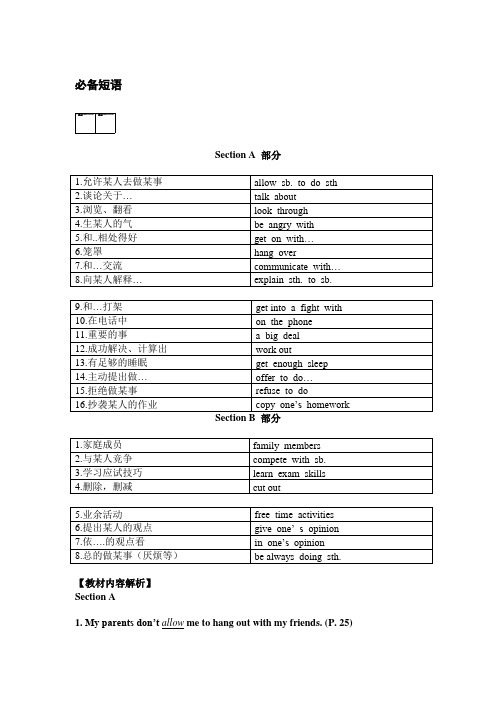
必备短语Section A 部分【教材内容解析】Section A1. My parents don’t allow me to hang out with my friends. (P. 25)① allow doing sth. 允许做某事翻译:The shopkeeper (店员) doesn’t allow smoking in any corner of the shop.__________________________________________② allow sb. to do sth. 允许某人做某事翻译:His parents allow him to play computer games if he finishes his homework. ____________________________________________2. I got into a fight with my best friend. (P. 25)get into a fight with sb.意为“和某人打架”,相当于have a fight with sb.或者fight with sb.。
翻译:He got drunk (醉酒的) and got into a fight with Jim._________________________________________3. What’s wrong? (P. 25)What’s wrong?意为“怎么了?”,用来询问对方有什么问题或者不顺心的事,What’s wrong with...?意为“……怎么了?”,后接sb.或者sth.,用来询问某人或者某物怎么了?---What’s wrong with you, Jim?---I left my umbrella on the bus.【拓展】询问“怎么了?”,主要有以下几种句型:What’s wrong (with sb./sth.)?What’s the matter (with sb./sth.)?What’s the trouble (with sb./sth.)?What’s up (with sb./sth.)?4. I’m really tired because I studied until midnight last night. (P. 25)until表示“直到”和延续性动词连用,意为一个动作一直持续到某个点为止;同短暂性行动连用时,用于“not...until”结构中,表示“直到……才……”。
新目标英语八年级下unit_4重点短语句型语法+配套试题(答案)
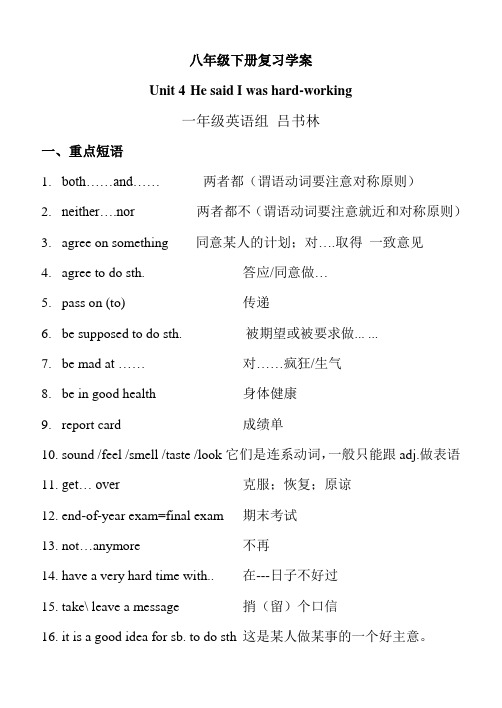
八年级下册复习学案Unit 4 He said I was hard-working一年级英语组吕书林一、重点短语1.both……and……两者都(谓语动词要注意对称原则)2.neither….nor 两者都不(谓语动词要注意就近和对称原则)3.agree on something 同意某人的计划;对….取得一致意见4.agree to do sth. 答应/同意做…5.pass on (to) 传递6.be supposed to do sth. 被期望或被要求做... ...7.be mad a t ……对……疯狂/生气8.be in good health 身体健康9.report card 成绩单10.sound /feel /smell /taste /look它们是连系动词,一般只能跟adj.做表语11.get… over 克服;恢复;原谅12.end-of-year exam=final exam 期末考试13.not…anymore 不再14.have a very hard time with.. 在---日子不好过15.take\ leave a message 捎(留)个口信16.it is a good idea for sb. to do sth 这是某人做某事的一个好主意。
17.there is no difference between…and..在…和…之间没有区别18.the Hope Project 希望工程本单元目标句型:1.转述他人话语:What did sb. say? He said I …She said she…They said…许老师告诉我徐梦蝶会说二种语言。
Mr. Xu told me that XuMengdie could speak three languages.许老师说地球绕着太阳转。
Mr. Xu said (that)the earth turns around the sun. 许老师告诉我他将去北京。
2020年春人教新目标英语八年级下册Unit4-5知识点总结

2020年春人教新目标英语八年级下册Unit 4 Why don’t you talk to your parents?1..用于提建议的句型有:What about doing sth ?=How about doing sth?(1). 同意对方的建议时,一般用:….怎么样?.Let’s do sth . 让我们一起做某事吧。
Shall we/I do sth? 我们做…好吗?had better do/not do sth 最好做/不做某事Will/Would you please do sth 请你做…好吗?Would you like to do sth? 你想去做某事吗?Would you mind doing sth?你介意做某事吗?Why don’t you do sth?= Why not do sth?为什么不呢?◆Good idea./ That’s good idea. 好主意◆OK/ All right./ Great 好/ 行/太好了◆Yes, please ./ I’d love t o 是的/ 我愿意◆I agree with you 我同意你的看法◆No problem 没问题◆Sure/ Of course/ Certainly 当然可以◆Yes, I think so 对,我也这样想(2).对对方的帮助或要求表示委婉谢绝时,一般用:◆I don’t think so 我认为不是这样◆Sorry, I can’t对不起,我不能◆I’d love to, but…◆I’m afraid…我愿意,但恐怕……2. allow doing sth 允许做某事allow sb. to do sth 允许某人做某事be allowed to do sth 被允许做某事allow与let的辨析:allow指“允许”,表示“默许,听任,不加阻止”,allow sb to do sth 允许某人做某事。
初中英语人教新目标八年级下册Unit4Grammar预习指导(知识点+练习题)
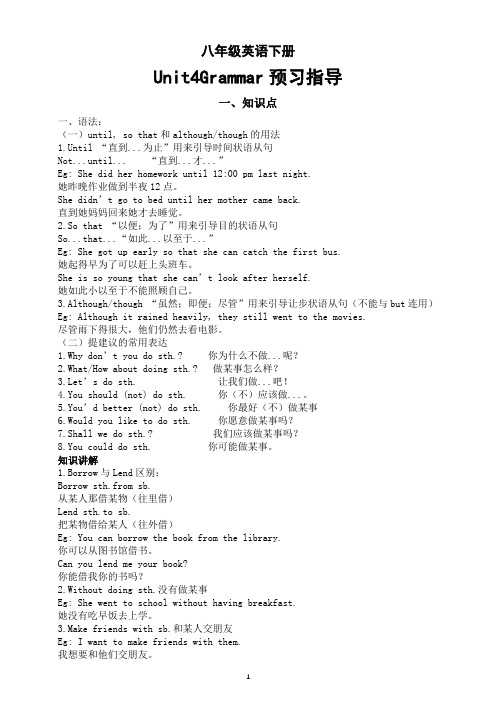
八年级英语下册Unit4Grammar预习指导一、知识点一、语法:(一)until, so that和although/though的用法1.Until “直到...为止”用来引导时间状语从句Not...until... “直到...才...”Eg: She did her homework until 12:00 pm last night.她昨晚作业做到半夜12点。
She didn’t go to bed until her mother came back.直到她妈妈回来她才去睡觉。
2.So that “以便;为了”用来引导目的状语从句So...that...“如此...以至于...”Eg: She got up early so that she can catch the first bus.她起得早为了可以赶上头班车。
She is so young that she can’t look after herself.她如此小以至于不能照顾自己。
3.Although/though “虽然;即便;尽管”用来引导让步状语从句(不能与but连用)Eg: Although it rained heavily, they still went to the movies.尽管雨下得很大,他们仍然去看电影。
(二)提建议的常用表达1.Why don’t you do sth.? 你为什么不做...呢?2.What/How about doing sth.? 做某事怎么样?3.Let’s do sth. 让我们做...吧!4.You should (not) do sth. 你(不)应该做...。
5.You’d better (not) do sth. 你最好(不)做某事6.Would you like to do sth. 你愿意做某事吗?7.Shall we do sth.? 我们应该做某事吗?8.You could do sth. 你可能做某事。
新目标人教版 八年级下Unit4-Unit10重点句子
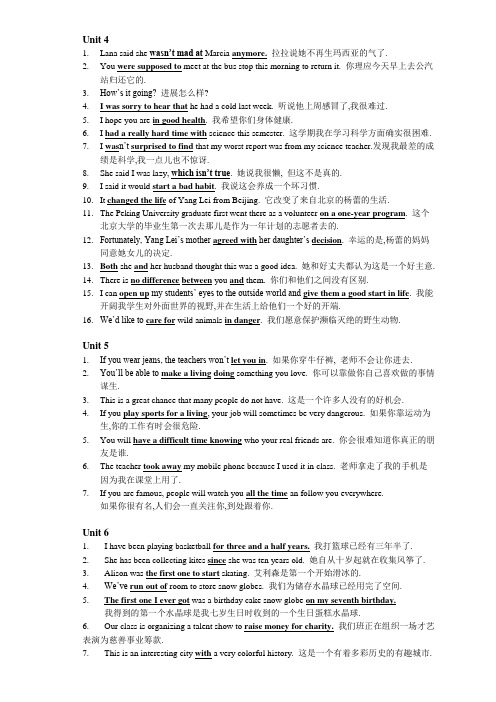
Unit 4na said she wasn’t mad at Marcia anymore.拉拉说她不再生玛西亚的气了.2.You were supposed to meet at the bus stop this morning to return it. 你理应今天早上去公汽站归还它的.3.How’s it going? 进展怎么样?4.I was sorry to hear that he had a cold last week. 听说他上周感冒了,我很难过.5.I hope you are in good health. 我希望你们身体健康.6.I had a really hard time with science this semester. 这学期我在学习科学方面确实很困难.7.I was n’t surprised to find that my worst report was from my science teacher.发现我最差的成绩是科学,我一点儿也不惊讶.8.She said I was lazy, which isn’t true. 她说我很懒, 但这不是真的.9.I said it would start a bad habit. 我说这会养成一个坏习惯.10.It changed the life of Yang Lei from Beijing. 它改变了来自北京的杨蕾的生活.11.The Peking University graduate first went there as a volunteer on a one-year program. 这个北京大学的毕业生第一次去那儿是作为一年计划的志愿者去的.12.Fortunately, Yang Lei’s mother agreed with her daughter’s decision. 幸运的是,杨蕾的妈妈同意她女儿的决定.13.Both she and her husband thought this was a good idea. 她和好丈夫都认为这是一个好主意.14.There is no difference between you and them. 你们和他们之间没有区别.15.I can open up my students’ eyes to the outside world and give them a good start in life. 我能开阔我学生对外面世界的视野,并在生活上给他们一个好的开端.16.We’d like to care for wild animals in danger. 我们愿意保护濒临灭绝的野生动物.Unit 51.If you wear jeans, the teachers won’t let you in. 如果你穿牛仔裤, 老师不会让你进去.2.You’ll be able to make a living doing something you love. 你可以靠做你自己喜欢做的事情谋生.3.This is a great chance that many people do not have. 这是一个许多人没有的好机会.4.If you play sports for a living, your job will sometimes be very dangerous. 如果你靠运动为生,你的工作有时会很危险.5.You will have a difficult time knowing who your real friends are. 你会很难知道你真正的朋友是谁.6.The teacher took away my mobile phone because I used it in class. 老师拿走了我的手机是因为我在课堂上用了.7.If you are famous, people will watch you all the time an follow you everywhere.如果你很有名,人们会一直关注你,到处跟着你.Unit 61. I have been playing basketball for three and a half years.我打篮球已经有三年半了.2. She has been collecting kites since she was ten years old. 她自从十岁起就在收集风筝了.3. Alison was the first one to start skating. 艾利森是第一个开始滑冰的.4. We’ve run out of room to store snow globes. 我们为储存水晶球已经用完了空间.5. The first one I ever got was a birthday cake snow globe on my seventh birthday.我得到的第一个水晶球是我七岁生日时收到的一个生日蛋糕水晶球.6. Our class is organizing a talent show to raise money for charity.我们班正在组织一场才艺表演为慈善事业筹款.7. This is an interesting city with a very colorful history. 这是一个有着多彩历史的有趣城市.8. Some of the old buildings in Harbin are in Russian style. 哈尔滨的一些老建筑具有俄罗斯风格.9. The first Jews probably came to Kaifeng more than a thousand years ago and werewelcomed by the Song Emperor.第一批犹太人很可能在一千多年前就来到了开封,受到了宋朝皇帝的热烈欢迎.10. The more I learn about Chinese history, the more I enjoy living in China. 我了解中国历史越多, 我就越喜欢居住在中国.11. Although I live quite far from Beijingt, I’m certain I will be there for the Olympic Game in2008.尽管我住得离北京很远, 但我相信我会在2008年为奥运会去那儿的.12. My friends in Australia said that Chinese history was very hard to understand.我澳大利亚的朋友说中国历史很难理解.Unit 71. Would you mind turning down the music? 你介意把音乐调小点吗?2. Could you please put out that cigarette? 你能把香烟熄掉吗?3. Your father is at a meeting. 你父亲在开会.4. The pen you bought didn’t work.你买的的钢笔不好使.5. This shirt is too long. Would you mind giving me a smaller one? 这件衬衫太长,你能给我一件小的吗?6. This happens to me all the time in the school library. 在图书馆里,这样的事情一直会在我身上发生.7. Perhaps in the future I should try not to be so polite. 也许将来我应该试着不这样有礼貌.8. Standing very close to the person you are talking with is quite common in some Asiancountries.在一些亚洲国家,与和你说话的人站得很近是十分普遍的.9. There are other places where talking loudly is not allowed. 在其它一些地方, 大声说话是不允许的.10. Even if you are with your friends, it is better to keep your voice down in public places.即使你和你朋友在一起, 你也最好在公共场合控制音量.11. In fact, we should also take care not to cough or sneeze in public. 事实上,我们还应该小心不在公共场合咳嗽或打喷嚏.12. If we see someone breaking the rules of etiquette, we may politely give them somesuggestions.如果我们看见有人违反礼节, 我们可以礼貌地向他们提出建议.13. People don’t usually like to be criticized.人们通常不喜欢受批评.14. The way people behave is different in different cultures and situations. 人们的行为方式在不同的文化和形势下是不同的.15. People in China and Europe have different ideas about etiquette.中国和欧洲的人在礼节方面有不同的观点.16. If someone cuts in front of you in a line, you could ask them, “Sorry, would you mindjoining the line? ”如果有人有你前面插队,你可以说, “对不起, 请你排队好吗?”17. Would you mind my/me smoking here? 你介意我在这儿抽烟吗?Unit 81. Why don’t you get her a scarf for her birthday? 你为什么不给她买条围巾作生日礼物呢?2. What’s the best gift you have ever received? 你收到的最好礼物是什么?3. What a lucky guy! 真是一个幸运的家伙!4. She is too big to sleep in the house. 她太大了, 不能睡在房子里.5. I fell asleep half way through the movie. 我电影看到一半就睡着了.6. Later, the same gift may be given away to someone else. 随后,同一份礼物可能被赠送给别人.7. Some people ask their families and friends to give money to charity rather than buy themgifts.一些人要他们的家人和朋友把钱捐给慈善事业而不是给他们买礼物.8. It’s enough to make a meal instead of buying gifts. 不买礼物,做一顿饭就足够了.9. Gift giving is different in different countries. 赠送礼物在不同的国家是不同的.10. Doing something for someone is the best gift. 为他人做一件事就是最好的礼物.11. Today many Chinese people want to improve their English in different ways.如今,许多中国人想有不同的方法提高他们的英语水平.12. Some of these singers were able to sing English songs just as well as native speakers.一些歌手可以把英语歌唱得和本族人一样好.13. This kind of contest encourages people in China to speak English. 这种比赛鼓励中国人说英语.14. Many people agree they make progress by singing English songs. 许多人同意他们通过唱英语歌取得了进步.15. It suggests ways for Beijingers to take an interest in learning English. 它为北京人提供了对学英语感兴趣的方法.16. Besides singing English songs, there are many other fun ways to learn English.除了唱英语歌, 还有许多其它的学英语的有趣方法.17. Maybe you could make friends with a native speaker of English. 也许你可以和说英语的本族人交朋友.18. Life with a pig isn’t always perfect. 和猪一起生活并不总是完美的.Unit 91. Have you ever been to an amusement park? 你曾经去过一个游乐场吗?2. Disneyland is an amusement park, but we can also call it a theme park.迪斯尼是一个游乐场,但我们也可以把它称为一个主题公园.3. It has all the normal attractions that you can find at an amusement park.你可以在游乐场发现的所有普遍的吸引人的事物, 它都有.4. The boats take different routes, but they all end up in the same place.这些船行驶不同的路线, 但它们都在同一个地方结束行程.5. Have you ever said anything you didn’t want to say? 你曾经说过你不想说的话吗?6. I have been to the aquarium. So has she. 我去过水族馆. 她也去过.7. I have never been there. Neither has my father. 我没去过那儿. 我我爸爸也没去过.8. When I was a young girl, all I ever wanted to do was travel, and I decided that the best wayto do this was to become a fight attendant.当我还是小女孩时, 我曾经想做的所有事就是去旅行, 而且我决定旅行的最好的方法就是成为一个空中服务员.9. It was because I could speak English that I got the job. 那是因为我会说英语, 我才得到了这份工作.10. This small island in Southeast Asia is a wonderful place to take a holiday.位于亚洲东南部的这个小岛是一个度假的好地方.11. More than three quarters of the population are Chinese. 四分之三以上的人口都是中国人.12. You won’t have any problem finding rice, noodles or dumplings. 你会毫不费力地找到米饭, 面条和饺子.13. It might seem strange to go to a zoo when it’s dark. 天黑时去动物园可能好像很奇怪.14. At the Night Safari, you can watch these animals in a more natural environment than a normal zoo.在夜间野生动物园,你可以在比一个普通的动物园更自然的环境里观看这些动物.15. One great thing about Singapore is that the temperature is almost the same all year round.关于新加坡的一个优点就是那儿的气温几乎全年是相同的.16. You can choose to go whenever you like.你可以选择你喜欢的时候去.17. A lot of animals only wake up at night, so this is the best time to watch them.许多动物只在夜晚是醒着的, 所以这是观看它们的最佳时间.Unit 101. It’s a nice day, isn’t it? 今天是个好天气,是吗?2. Sometimes it isn’t easy being the new kid at school. 有时在一所学校做一名新生并不容易.3. Thank you so much for inviting me. 非常谢谢你邀请我.4. I feel like part of the group now. 我现在感觉像这个团体的一部分了.5. I was having a hard time finding it until you came along.我一直很费劲地寻找它直到你过来.6. Friends like you make it a lot easier to get along in a new place. 像你这样的朋友使得在一个新地方相处轻松得多.7. I’ll think of you as we watch the Black Socks win the game. 当我们观看黑袜队获胜时我会想起你的.8. I need some money. I’m going to look through the newspaper for a holiday job.我需要一些钱. 我将浏览报纸找一份假期工作.9. She never drinks milk, does she? 她从来不喝牛奶,是吗?10. Do you think the rain will stop by noon. 你认为寸到中午会停吗?11. I need some more people for our baseball team. 我们的棒球队还需要一些人.12. I’m preparing for the math test. 我正在为数学考试作准备.。
人教新目标英语八年级下册Unit-4---5重难点知识复习

重难点知识复习Unit 4 Why don’t you talk to your parents?一.词型转换。
relation n.关系----relationship n.关系communicate v.交流-----communication n.交流argue v.争执---- argument n.争执cloud n云--- cloudy adj.多云的proper adj.合适的---- properly adv.合适地explain v.解释---- explanation n.解释clear adj.清楚的--- clearly adv.清楚地press v.按、压---- pressure n.压力compete v.竞争--- competition n.竞赛quick adj.快的--- quickly adv. 快地develop v.发展--- development n.发展usual adj.普遍的--- usually adv.通常unusual adj.不寻常的二、重点短语1. have free time to do sth有空闲时间2. allow sb. to do sth. 允许某人做某事allow doing sth 允许做某事be allowed to do sth 被允许做某事3. hang out with sb. 与某人闲逛4. have \ take after-school classes课外活动课5. get into a fight with sb. 与某人吵架/打架fight with与某人吵架/打架have a fight with sb 与某人吵架/打架6. until midnight直到半夜7. talk to sb. 与某人交谈8. wait that long 等太久9. study too much学得过多10. get enough sleep有足够的睡眠11. write sb. a letter给某人写信12. talk about sth on the phone在电话上交谈某事13. surprise sb. 令某人惊讶14. look through翻看15. be angry with sb. 生某人的气16. a big deal重要的事deal with sth.处理某事17. work out成功地发展;解决18. get on\along with和睦相处;关系良:19. fight a lot经常吵架/打架20. hang over笼罩21. refuse to do sth. 拒绝做某事22. offer to do sth. 主动提出做某事23. so that以便24. mind sb. doing sth. 介意某人做某事25. all the time一直26. in future今后27. make sb. angry使某人生气28. worry about sth. 担心某事29. copy one’s homework抄袭某人的作业30. be oneself做自己31. family members 家庭成员32. spend time alone独自消磨时光33. give sb. pressure给某人施压34. argue with sb\have an argument with sb.与某人吵架35. compete with sb. 与某人竞争36. free time activities业余活动37. get better grades取得更好的成绩38. give one’s opinion提出某人的观点in one’s opinion 在某人看来39. learn exam skills学习应试技巧40. all kinds of 各种各样的a kind of 一种kind of +adj.有点41. cause stress造成压力42. cut out删除43.be nice to sb 对。
人教新目标英语八年级下册unit4单元知识讲解
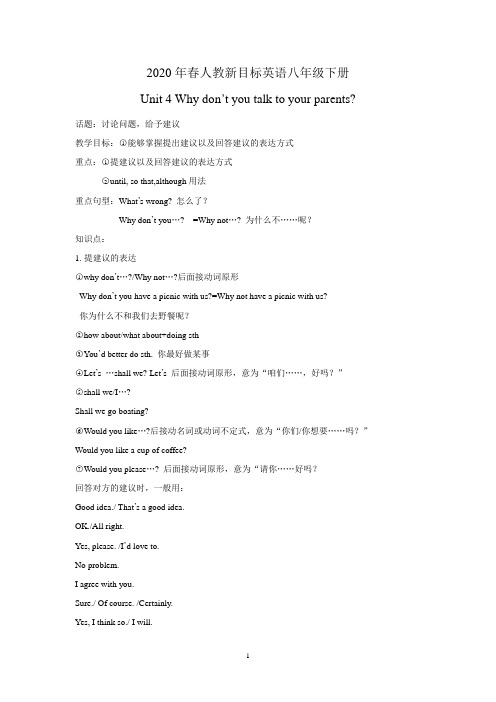
2020年春人教新目标英语八年级下册Unit 4 Why don’t you talk to your parents? 话题:讨论问题,给予建议教学目标:○1能够掌握提出建议以及回答建议的表达方式重点:○1提建议以及回答建议的表达方式○2until, so that,although用法重点句型:What’s wrong? 怎么了?Why don’t you…? =Why not…? 为什么不……呢?知识点:1.提建议的表达○1why don’t…?/Why not…?后面接动词原形Why don’t you have a picnic with us?=Why not have a picnic with us?你为什么不和我们去野餐呢?○2how about/what about+doing sth○3You’d better do sth. 你最好做某事○4Let’s …shall we? Let’s 后面接动词原形,意为“咱们……,好吗?”○5shall we/I…?Shall we go boating?○6Would you like…?后接动名词或动词不定式,意为“你们/你想要……吗?”Would you like a cup of coffee?○7Would you please…? 后面接动词原形,意为“请你……好吗?回答对方的建议时,一般用:Good idea./ That’s a good idea.OK./All right.Yes, please. /I’d love to.No problem.I agree with you.Sure./ Of course. /Certainly.Yes, I think so./ I will.表示拒绝时,一般用:I don’t think so./ Sorry, I can’t. /Sorry, but…I’d love to/ like to, but…/I’m afraid…2.until○1作介词“直到……为止”The meeting may last until Friday.○2作连词,直到……为止,在……以前,不到……a.用于肯定句中Heat can be conducted from a hot body to a cooler one until both are at the same temperature.热量可以从一个热的物体传到一个较冷的物体,直到两者温度相同为止。
2020年春人教新目标英语八年级下册Unit-4第1-2课时知识点总结

2020年春人教新目标英语八年级下册Unit 4 Why don’t you talk to your parents?第一课时1. You look tired. 你看起来疲劳。
系动词look看起来, turn变得, get成为, taste尝起来, sound听起来, become变成, keep保持, feel感觉到,look young看起来年轻;turn green变成了绿色;get longer变得更长了;taste good尝起来好吃;sound fun听起来有趣;become stronger变得更强壮了;keep quiet 保持安静;feel/be healthy 感觉很健康2. until 直到not …until …直到…才…你应该一直等到直到为考试学习的最后一分钟。
You should n’t wait until the last minute to study for a test. 你不该一直等到考试学习前的最后一分钟。
However, the tired children didn’t I didn’t sleep until 9 o’clock last night. 然而,这些疲劳的孩子们直到晚上九点才睡着。
get enough sleep 得到足够的睡眠3. forget to do sth./forget doing sth. 忘记去做某事/忘记做过某事;leave sth. +地点; 把某物忘在/落在某处;把你的作业忘在家里了leave your homework at homealthough引导让步状语从句,不与but, however连用。
Although she's wrong, it is not a big deal.尽管她做的不对,但也没什么了不起的。
big deal重要的事情或状况4. Hope things work out. 希望事情会好起来。
人教新目标英语八年级下册unit4重点短语
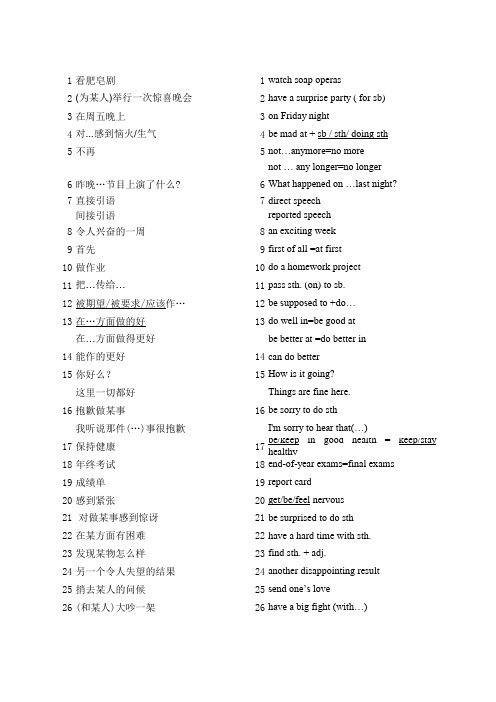
1看肥皂剧1watch soap operas2(为某人)举行一次惊喜晚会2have a surprise party ( for sb)3在周五晚上3on Friday night4对...感到恼火/生气4be mad at + sb / sth/ doing sth5不再5not…anymore=no morenot … any longer=no longer6昨晚…节目上演了什么?6What happened on …last night?7直接引语7direct speech间接引语reported speech8令人兴奋的一周8an exciting week9首先9first of all =at first10做作业10do a homework project11把…传给…11pass sth. (on) to sb.12被期望/被要求/应该作…12be supposed to +do…13在…方面做的好13do well in=be good at在…方面做得更好be better at =do better in14能作的更好14can do better15你好么?15How is it going?这里一切都好Things are fine here.16抱歉做某事16be sorry to do sth我听说那件(…)事很抱歉I'm sorry to hear that(…)17保持健康17be/keep in good health=keep/stayhealthy18年终考试18end-of-year exams=final exams19成绩单19report card20感到紧张20get/be/feel nervous21对做某事感到惊讶21be surprised to do sth22在某方面有困难22have a hard time with sth.23发现某物怎么样23find sth. + adj.24另一个令人失望的结果24another disappointing result25捎去某人的问候25send one’s love26(和某人)大吵一架26have a big fight (with…)27一切从…时开始27It all started when…28抄某人/别人的作业28copy one’s / others’ homework 29养成坏习惯29start a bad habit30确信…30be suer (that)…31原谅/克服…31get over…32某人自己的…32...of one’s own(放句尾)=one’s own...(放句中)33听起来像…33sound like+…34改变某人的生活34change one’s life=change the life of sb. 35北京大学35Peking University36进行一个为期一年的计划36on a one-year program37教育部37the Ministry of Education38中国少年先锋队38Chinese Young Pioneer39由…发起39be started by…40中国农村地区40China’s rural areas41对某人来说是一个新的经历41be a new experience for sb42海平面42sea level海拔2000米2000 meters above sea level43稀薄的空气43thin air44使某人觉得恶心44make sb feel sick45经历不同的事45experience different things 46…和...都46both…and…47在…和… 之间没有差异47There is no difference between …and…48高中48(senior) high school49给某人生活一个好的开始49give sb a good start in life50打开某人对外面世界的视野50open up one’s eyes to the outside world 51在某人的生活中有一个好的影响51be a good influence in one’s life52回到…52return to… = go/get back to 把…还给return sth to ……=give sth back to…53暂时53for now54在危险之中54in danger55照顾、照料55care for…=look after…=take care of …。
版新目标八年级下册英语unit4-why-don't-you-talk-to-your-parents重点知识讲解
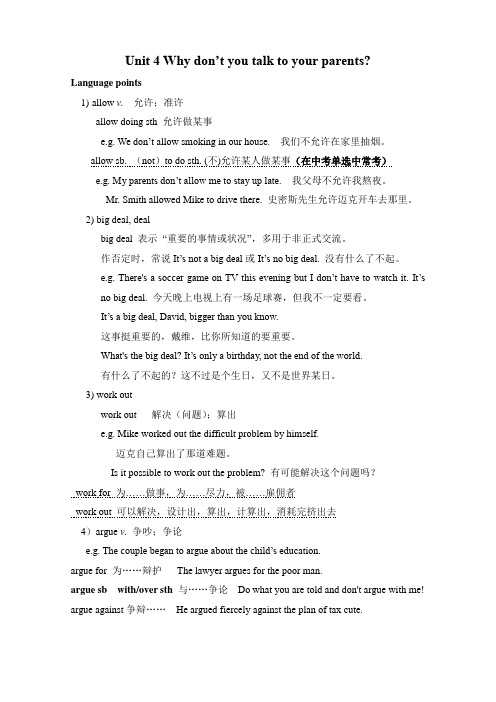
Unit 4 Why don’t you talk to your parents?Language points1)allow v. 允许;准许allow doing sth 允许做某事e.g. We don’t allow smoking in our house. 我们不允许在家里抽烟。
allow sb. (not)to do sth. (不)允许某人做某事(在中考单选中常考)e.g. My parents don’t allow me to stay up late.我父母不允许我熬夜。
Mr. Smith allowed Mike to drive there. 史密斯先生允许迈克开车去那里。
2) big deal, dealbig deal 表示“重要的事情或状况”,多用于非正式交流。
作否定时,常说It’s not a big deal或It’s no big deal.没有什么了不起。
e.g. There's a soccer game on TV this evening but I don’t have to watch it.It’sno big deal. 今天晚上电视上有一场足球赛,但我不一定要看。
It’s a big deal, David, bigger than you know.这事挺重要的,戴维,比你所知道的要重要。
What's the big deal? It’s only a birthday, not the end of the world.有什么了不起的?这不过是个生日,又不是世界某日。
3) work outwork out 解决(问题);算出e.g. Mike worked out the difficult problem by himself.迈克自己算出了那道难题。
Is it possible to work out the problem? 有可能解决这个问题吗?work for 为……做事,为……尽力,被……雇佣者work out 可以解决,设计出,算出,计算出,消耗完挤出去4)argue v. 争吵;争论e.g. The couple began to argue about the child’s ed ucation.argue for 为……辩护The lawyer argues for the poor man.argue sb with/over sth 与……争论Do what you are told and don't argue with me! argue against争辩……He argued fiercely against the plan of tax cute.5). proper adj.正确的;恰当的e.g. It’s not proper to visit a friend too late in the evening.太晚了,去看朋友不合适。
人教版八年级下册各单元英语语法解析知识重点总结
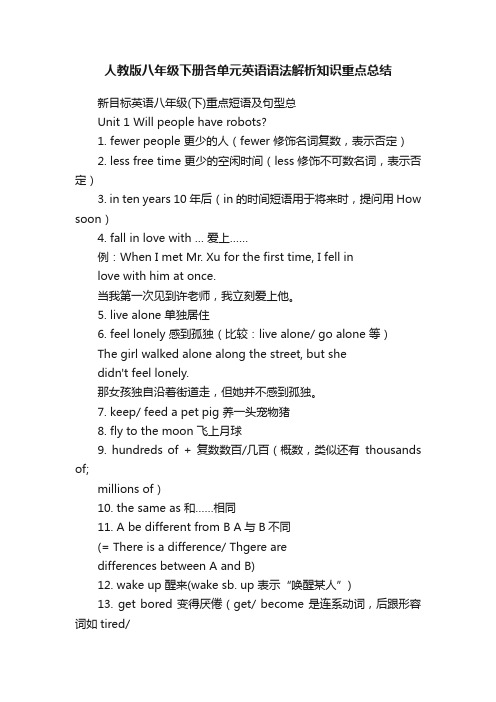
人教版八年级下册各单元英语语法解析知识重点总结新目标英语八年级(下)重点短语及句型总Unit 1 Will people have robots?1. fewer people 更少的人(fewer 修饰名词复数,表示否定)2. less free time 更少的空闲时间(less 修饰不可数名词,表示否定)3. in ten years 10年后(in 的时间短语用于将来时,提问用How soon)4. fall in love with … 爱上……例:When I met Mr. Xu for the first time, I fell inlove with him at once.当我第一次见到许老师,我立刻爱上他。
5. live alone 单独居住6. feel lonely 感到孤独(比较:live alone/ go alone 等)The girl walked alone along the street, but shedidn't feel lonely.那女孩独自沿着街道走,但她并不感到孤独。
7. keep/ feed a pet pig 养一头宠物猪8. fly to the moon 飞上月球9. hundreds of + 复数数百/几百(概数,类似还有thousands of;millions of)10. the same as 和……相同11. A be different from B A与B不同(= There is a difference/ Thgere aredifferences between A and B)12. wake up 醒来(wake sb. up 表示“唤醒某人”)13. get bored 变得厌倦(get/ become 是连系动词,后跟形容词如tired/angry/ excited 等)14. go skating 去滑冰(类似还有go hiking/ fishing /skating/ bike riding 等)15. lots of/ a lot of 许多(修饰可数名词、不可数名词都可以)16. at the weekends 在周末17. study at home on computers 在家通过电脑学习18. agree with sb. 同意某人(的意见)19. I don't agree. = I disagree. 我不同意。
新目标英语八年级下Unit-4-Why-don’t-you-talk-to-your-parents知识点重点短语
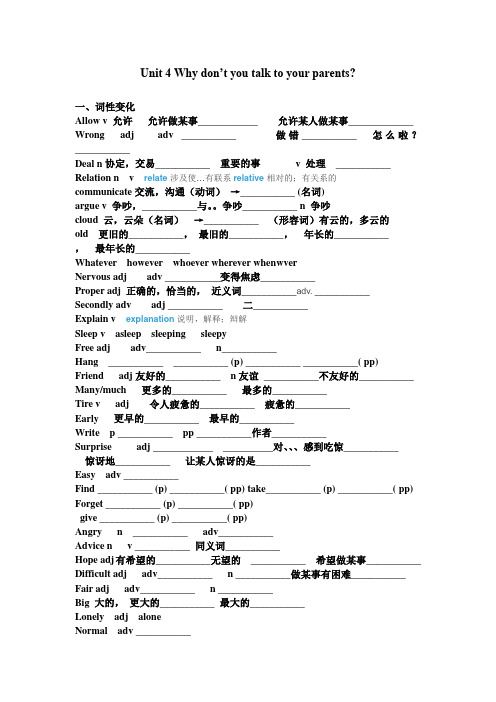
Unit 4 Why don’t you talk to your parents?一、词性变化Allow v 允许允许做某事____________ 允许某人做某事_____________ Wrong adj adv ___________ 做错___________ 怎么啦?___________Deal n协定,交易___________ 重要的事v 处理___________ Relation n v relate 涉及使…有联系relative 相对的;有关系的communicate交流,沟通(动词)→___________ (名词)argue v 争吵,___________与。
争吵___________ n 争吵cloud 云,云朵(名词)→___________ (形容词)有云的,多云的old 更旧的___________,最旧的___________,年长的___________,最年长的___________Whatever however whoever wherever whenwverNervous adj adv ___________变得焦虑___________Proper adj 正确的,恰当的,近义词___________adv. ___________Secondly adv adj ___________ 二___________Explain v explanation 说明,解释;辩解Sleep v asleep sleeping sleepyFree adj adv___________ n___________Hang ___________ ___________ (p) ___________ ___________( pp)Friend adj友好的___________ n友谊___________不友好的___________ Many/much 更多的___________ 最多的___________Tire v adj 令人疲惫的___________ 疲惫的___________Early 更早的___________ 最早的___________Write p ___________ pp ___________作者___________Surprise adj ____________ __________对、、、感到吃惊___________惊讶地___________ 让某人惊讶的是___________Easy adv ___________Find ___________ (p) ___________( pp) take___________ (p) ___________( pp) Forget ___________ (p) ___________( pp)give ___________ (p) ___________( pp)Angry n ___________ adv___________Advice n v ___________ 同义词___________Hope adj有希望的___________无望的___________ 希望做某事___________ Difficult adj adv___________ n ___________做某事有困难___________ Fair adj adv___________ n ___________Big 大的,更大的___________ 最大的___________Lonely adj aloneNormal adv ___________二、重点短语1. why don’t you + 动词原形+ …? = why not + + 动词原形+ …? 为什么不…?2. ___________ 允许某人做某事___________允许做某事3. ___________ 与某人闲逛4. ___________课外辅导班5. ___________. = have a fight with sb与某人吵架/打架6. ___________直到半夜7. ___________. 与某人交谈(单方面的说话) ___________和某人交谈(双方的谈话)8. ___________有空闲时间9. ___________学得过多10. ___________有足够的睡眠11. ___________给某人写信12. ___________打电话给某人13. ___________ 令某人惊讶14. ___________翻看,浏览相当于___________谈论关于…15. ___________ 生某人的气thank sb for +名词/代词/动名词16. ___________重要的事17. ___________成功地发展;解决, 改善18. ___________ 和睦相处;关系良好19. ___________经常吵架/打架20. ___________+ 名词/代词/动名词“擅长于...” ___________对…有好处21. ___________ 拒绝做某事22. ___________ 主动提出做某事= offer sth to sb给某人提供某物23. ___________以便,为了= ___________ (后都跟从句,且从句经常用can,could等情态动词)24. ___________ 介意做某事___________ 介意某人做某事25. without +名词/代词/动名词“在没有…的情况下26 ___________ 与……比较27. ___________使某人生气28. ___________ 担心某事29. ___________抄袭某人的作业30. ___________做自己三重点词法1.Why don’t you talk to your parents? 你为什么不和你打父母谈谈呢?【解析】Why don't you do sth ?= Why not do sth? 为什么不......呢?【拓展】用于提建议的句型有:(1) ___________ ….怎么样?(2) ___________?= Why not do sth? 为什么不呢?(3) ___________.让我们一起做某事吧。
- 1、下载文档前请自行甄别文档内容的完整性,平台不提供额外的编辑、内容补充、找答案等附加服务。
- 2、"仅部分预览"的文档,不可在线预览部分如存在完整性等问题,可反馈申请退款(可完整预览的文档不适用该条件!)。
- 3、如文档侵犯您的权益,请联系客服反馈,我们会尽快为您处理(人工客服工作时间:9:00-18:30)。
英语八年级教案
杨树芳
Section B 第4 课时(2a〜2b)
自主学习方案
1.自学生词,并记住拼读及拼写。
2.预习课本,找出重点短语及句子。
3.读记后完成自学导练作业。
课堂导学方案
Step 1展示教学目标
1.通过阅读短文进一现在完成时。
2.小结现在完成时和一段时间连用的用法(since,for的用法)
Step 2完成教材2a—2b的任务
1.首先回答2a中的三个问题,然后快速阅读2a 短文,看看自己的答案是否和文中答案一致。
2.认真阅读短文,从短文中找出意思一样的单词或短语来替代2b 中的单词和短语,完成后请学生说出答案,教师点拨。
3.再次细心阅读短文,理解每一句话的意思,小组合作解决遇到的疑难问题。
4.教师点拨短文中出现的重点和难点。
5.熟读短文,识记并背诵知识要点。
6.小结训练。
( D )(1)I search information through the Internet.
A. to B . on C. in D. for
( C ) (2) We came to Nanjing three years ago,so we here for three years.
A. have been to
B. have been in
C . have been D. have gone
( D ) (3)They regarded those homeless children great sympathy.
A. for B . to C. about D. with
( B ) (4) According the timetable,the traingets inat 8:27.
A. for
B. to
C.about
D.with
(B )( 5 ) He tells me he Chine for over five years.
A. has been B . has been in
C.has been to
D.has gone to
( C ) (6) my opinion,it,s enough for a family to have one child.
A. To
B. On
C. In
D. For
环节说明:通过本环节的学习不仅锻炼了学生的阅读能力,而且通过小结训练让学生对重点知识点进行了巩固练习。
Step 3问题探究
( D )1. He regarded this new air conditioner interest.
A. to
B. in
C. at
D. with
根据句意“他对他的新空调很感兴趣”,regard… with意为“以(某种心态)来看……”。
故答案选择D。
( D )2. the weather forecast,we shall have rain tomorrow.
A. As for
B. To be honest
C. Stay the same
D. According to
根据句意“根据天气预报,明天会下雨”,according to意为“根据”,主要用来表示“根据”某学说、某书刊、某人所说等)或表示“按照”某法律、某规定、某惯例、某情况等)。
教学反思
本课时涉及到了家乡,引导学生发现家乡的变化,贴近学生现实生活,能引起学生的表达欲望和学习兴趣。
